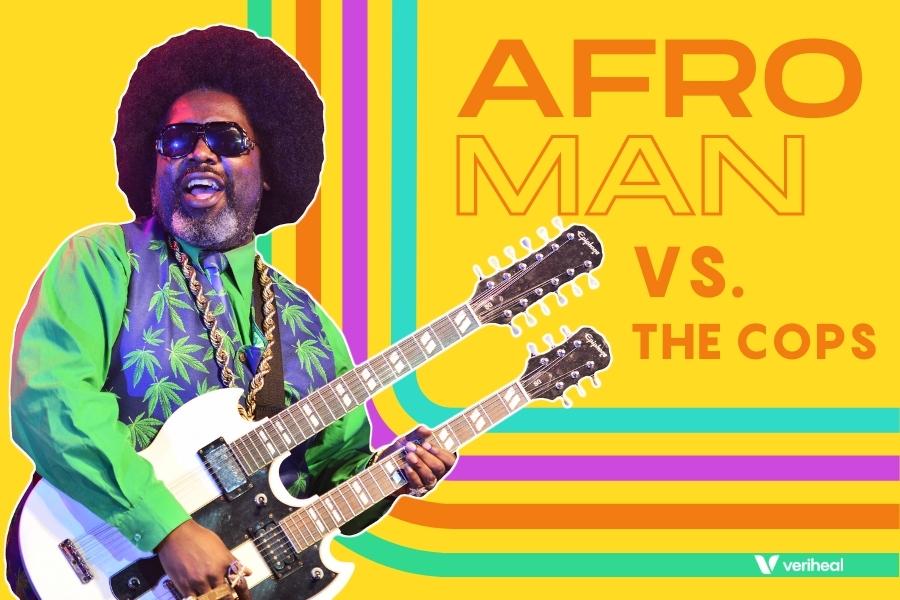The American Civil Liberties Union (ACLU) and its Ohio chapter have stepped in to support rapper Afroman in a civil lawsuit filed against him by seven police officers. The officers are angry over Afroman’s use of surveillance footage from their failed marijuana raid on his home in his new music video. Afroman, who rose to fame with his 2000 hit single “Because I Got High,” has long been associated with cannabis use and culture. In this article, we’ll delve into the case’s details and explore its legal and cultural implications.
Background of the Case
In 2022, local sheriff’s office members raided Afroman’s home in Adams County, Ohio. Authorities aimed to uncover cannabis and drug paraphernalia and investigate potential kidnapping allegations.
Despite the extensive search, only trace amounts of cannabis were found. Afroman, whose legal name is Joseph E. Foreman, creatively incorporated footage from his home security cameras capturing the botched raid, into a music video for his track, “Will You Help Me Repair My Door.” The video instantly went viral and has garnered more than 5.8 million views as of publishing.
In the controversial music video, the officers can be seen conducting the raid on Afroman’s home (he wasn’t home at the time), using excessive force to enter and search the property. The officers’ aggressive approach resulted in significant damage to the property. The security footage featured in the music video highlights broken doors, shattered windows, and disarray caused by the officers’ forceful search. Officers carelessly tossed the family’s personal belongings and damaged furniture in their efforts to find the suspected cannabis and drug paraphernalia.
One particularly troubling scene in the video features an officer taking money from clothes hanging in Afroman’s closet. This incident has been a significant point of contention, as it raises questions about the officers’ integrity and motives during the search.
The music video also underscored the excessive force used in the search that ultimately uncovered only trace amounts of cannabis. By including this footage in his music video, Afroman draws attention to the potential misconduct committed by the officers and further fuels the debate surrounding the case.
The Police Officers’ Lawsuit
The police officers involved in the raid have filed a lawsuit against Afroman and five other entities associated with the Afroman brand. They claim their likenesses were used commercially without consent, resulting in “humiliation, ridicule, mental distress, embarrassment, and loss of reputation.” The officers are demanding a trial by jury and are seeking damages, injunctive relief, and other remedies in excess of $25,000.
Why You Should Get Your Medical Marijuana Card
Veriheal has satisfied millions of patients nationwide by giving them access to these benefits
- Larger purchase limits
- Peace of mind
- Enhanced legal protection
- Access to higher potency strains
- Save up to 25% on cannabis purchases
- Skip the line at the dispensary
ACLU’s Proposed ‘Amicus Brief’ and Arguments
In response, the ACLU submitted a proposed amicus brief supporting Afroman, describing the police officers’ lawsuit as a meritless SLAPP suit aimed at silencing criticism. A SLAPP suit, or Strategic Lawsuit Against Public Participation, is a legal action intended to intimidate, censor, and silence critics through a lawsuit’s unnecessary expenses and stress rather than seeking a just outcome.
The brief argues that the First Amendment fiercely protects criticism of public officials regarding matters of public concern. According to the ACLU, the initial lawsuit has several legal deficiencies, such as not identifying any false statements in the videos.
Afroman’s Response and Potential Countersuit
Afroman has responded to the lawsuit by addressing the media, declaring his intention to file a countersuit against the officers. Responding to the raid, he expressed his frustration by stating, “I want to sue them for stealing my money, I want to sue them for writing ‘kidnapping’ on a warrant and making me suffer financially in my industry because just that accusation makes people raise an eyebrow about you.” Afroman maintains that his actions fall under the premise of free speech.
Unraveling the Impact on Free Speech, Artistic Expression, and Cannabis Stigma
The case involving Afroman and the police officers raises essential questions about First Amendment rights and the ongoing debate surrounding marijuana prohibition enforcement. The outcome of this lawsuit could have significant implications on public discourse and the ability to criticize public officials, ultimately shaping the future of free speech and artistic expression.
Additionally, this lawsuit brings attention to the stigma associated with cannabis use. The aggressive and ultimately fruitless search of his home may serve as a reflection of lingering prejudices against cannabis users. As more states and countries move towards decriminalizing and legalizing marijuana, cases like this underscore the need to address the social stigma and misinformation surrounding the plant.
By raising awareness and encouraging open conversations, we can foster a more informed and accepting society, ultimately contributing to the ongoing destigmatization of cannabis use.
Note: The content on this page is for informational purposes only and is not intended to be professional medical advice. Do not attempt to self-diagnose or prescribe treatment based on the information provided. Always consult a physician before making any decision on the treatment of a medical condition.
Author, Share & Comments
















